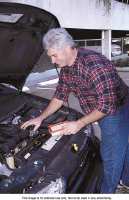Preventive Maintenance to Keep Your Car on the Road

Posted by peter88
from the Automotive category at
14 Jul 2011 10:53:26 pm.

As the economy begins to rebound, a good percentage of motorists have resolved to keep their vehicles on the road longer in an effort to stretch their automobile dollars. That's a sound resolution, and one that is not necessarily difficult to accomplish. Contrary to popular belief, cars are built to last, and it's often a driver's poor habits that reduce a car's life expectancy as opposed to the vehicle manufacturer's product. Drivers can lengthen a vehicle's lifespan by employing preventive maintenance that should keep a car running strong for years to come.
Air Filter
When examining the vehicle's air filter (check the vehicle manual for location), look for dirt or dust buildup. If the filter is filthy, simply replace it. Auto parts stores sell air filters, and most drivers shouldn't have trouble replacing a filter by themselves. A dirty air filter can negatively effect fuel economy and make it seem as though a vehicle is constantly going uphill in a stiff wind. When a dirty air filter is replaced, drivers will notice an instant impact in how the car drives and are likely to save a few dollars at the filling station as well.
Belts and Hoses
Issues with belts or hoses are often recognizable to the naked eye, regardless of a driver's automotive skill. A hose in poor condition can appear bulging or brittle, and should not feel too soft or too hard. If a hose exhibits any of these symptoms, replace it. A belt that's worn or frayed should also be replaced.
Brake Fluid
One of the more expensive repair jobs on a vehicle is to replace the brakes. Brakes will need to be replaced over the course of a vehicle's lifespan, but drivers should routinely check the vehicle's brake fluid. Without sufficient brake fluid, the brakes' lifespan decreases dramatically. Checking the brake fluid is easy; simply look in the owner's manual to find brake fluid reservoir and remove the lid (some vehicles might require the lid be unscrewed). The reservoir will likely have instructions on the inside advising how much brake fluid should be added. If the fluid is below the line of demarcation, add fluid up to that line. But be careful not to overfill. Check the brake fluid levels on a monthly basis.
Motor Oil
Oil change guidelines have changed dramatically thanks to better cars and more reliable motor oils. But it still helps to check motor oil levels after every fill up. If motor oil levels are low, add more oil. If oil is significantly low after each fill up, consult a mechanic just to be safe.
Exhaust
Once a year, be it at a routine tune up or should repair work be necessary, ask your mechanic to check the vehicle's emissions. Failing an emissions test might be against the law, and a failed test could be indicative of a larger problem.
In addition, inspect the muffler and exhaust pipe for holes, particularly after winter, when debris from snow trucks may do significant damage. Replace any damaged or rusted parts.
Power Steering
Power steering fluid should also be inspected on a monthly basis. When checking power steering fluid, also inspect the pump for any leaks.
Tires
Keeping tires properly inflated pays numerous dividends. Properly inflated tires make it easier for the engine to operate, lowering fuel costs while also decreasing wear and tear on the engine. The owner's manual should list a recommended tire pressure, and the local filling station likely has an air pump.
Maintaining tires also involves checking for wear and tear. Uneven wear could indicate the tires are misaligned. Discuss this with your mechanic.
Transmission Fluid
When checking transmission fluid, do so while the car is running and after the engine has warmed up. Always be certain to put the parking brake on when checking transmission fluid. If the vehicle needs transmission fluid, add the recommended fluid but be careful not to overfill.
Prolonging a vehicle's lifespan is not as difficult as it sounds. Oftentimes, all it takes is minor, yet routine, maintenance to keep a car on the road for years and years.
0 Comments



